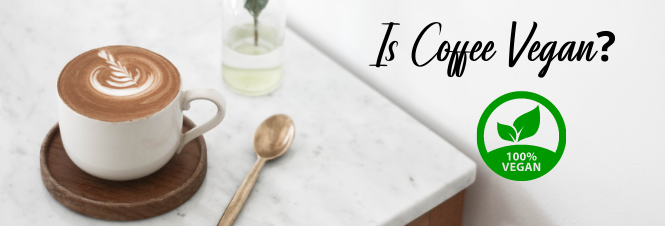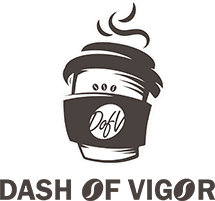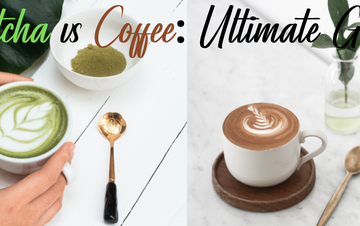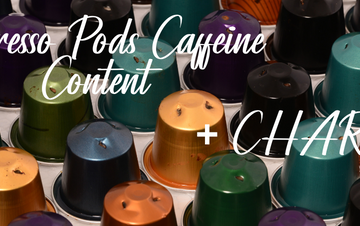Is Coffee Vegan? 5 Vegan Coffee Recipes

Is Coffee Vegan? Coffee is plant-based, so it can not be more vegan than that. Do not worry about it.
Of course, coffee is vegan if it is black. However, if you like it softer and with milk taste, you can use plant milk.
I prepared several options for you and more in-depth information.
Let`s get started.
TABLE OF CONTENTS:
- What Is Vegan Coffee?
- Black Vs. Milky Vegan Coffee
- Vegan Coffee Creamer
- Vegan Lifestyle and Ethical Coffee
- What’s The Best Coffee Machine for Vegans?
- Top 5 Tasty Vegan Coffee Recipes
What Is Vegan Coffee?
Veganism is a diet that excludes all animal products from one’s diet. This includes eating meat, fish, eggs, dairy, and other animal-derived byproducts.
Vegans also avoid purchasing animal-tested cosmetics, leather, or other things that employ animals in the manufacturing process.
So we come to the question: then, is coffee vegan?
Coffee is entirely plant-based and safe for vegans since it is derived from the coffee cherry plant. The production method is also animal-free.
If all regular coffee is vegan, there is no need to seek a “vegan” label on coffee beans since the label is just for marketing reasons.
Black Vs. Milky Vegan Coffee
The coffee must be consumed black to be vegan. Because vegans do not eat dairy products, adding milk to coffee is unsuitable for plant-based diets.
Black coffee has additional advantages, such as being rich in antioxidants and low in calories. It does not influence blood sugar levels, so many health-conscious individuals choose to drink it this way.
Since black coffee is an acquired and popular taste, several vegan versions are now accessible in shops and cafés.
If you’re a milk-lover, the following top vegan coffee kinds of milk are precisely for you!
Oat Milk
Oat milk tastes similar to dairy milk, includes vitamins A, D, and B12, and is suitable for steaming.
Soy Milk
Soy milk is popular and widely accessible in cafés worldwide. It has a mild taste and a smooth, creamy texture that foams fantastically but might curdle when combined with cold coffee.
Almond Milk
Almond milk is a popular option since it has a delicate nutty flavor that goes well with coffee. However, some almond milk isn’t exceptionally creamy and may split depending on the quality.
Coconut Milk
If you choose a reputable brand, coconut milk will have a slight tropical coconut taste and smoothness.
Aside from these more popular alternatives, you may add macadamia milk, hemp milk, rice milk, cashew milk, or hazelnut milk to your coffee.
Vegan Coffee Creamer
When purchasing coffee creamers, the only thing to look out for is that vegans should avoid creamers branded as dairy-free or lactose-free.
While these goods are safe for lactose intolerant people, they still contain casein produced from milk, making them unsuitable for vegans.
Vegan Lifestyle and Ethical Coffee
The vegan lifestyle entails more than just avoiding animal products in one’s diet. Most vegans consider it a lifestyle option rather than a dietary need. That means they endeavor to only purchase things that are ethical, good for the environment, and care about our world, animals, and people.
When considering this, keep in mind that specific coffee may be produced and processed in ways that contradict the vegan ideology. To ensure that the coffee you consume is compatible with the vegan lifestyle, avoid coffee that employs hazardous chemical pesticides, harms the environment, or does not compensate farmers.
Instead of looking for the “vegan” label on coffee beans, seek these certifications and characteristics to make your coffee vegan-friendly.
Shade-grown Coffee
Shade-grown coffee beans are safer for animals. They preserve biodiversity, minimize the need for fertilizers, increase soil quality, and reduce soil erosion compared to sun-grown coffee beans.
Bird-friendly Certification
This accreditation indicates that the coffee beans were farmed to protect birds and their natural environment.
Rainforest Alliance Certification
This assures that the coffee beans are grown in a manner that safeguards animals, streams, and soils and looks out for their farmers.
Organic Coffee
Organic coffee is grown without the use of toxic chemical pesticides or fertilizers that harm the environment. Purchasing organic coffee decreases its environmental effect by reducing soil erosion, poisonous water runoff, and soil nutrient depletion.
Fair Trade Coffee
Vegan coffee promotes ethical supply systems that benefit farmers rather than large companies.
Fairtrade certified coffee helps farmers and their families live better lives. Providing fair compensation for their goods and encouraging community development and open trade agreements are ways to accomplish this.
Vegan Decaf Coffee
Coffee is decaffeinated by soaking green seeds in hot water and dissolving the caffeine oils in methylene dichloride and ethyl acetate.
While this procedure does not utilize any animal products, it does employ chemicals that may not be compatible with a vegan diet.
What’s The Best Coffee Machine for Vegans?
While classic espresso machines are generally vegan-friendly, alternative coffee makers that employ capsules might be problematic for vegans.
Because the aluminum structure of plastic-coated capsules is challenging to separate and recycle, around 30,000 tablets wind up in landfills each year. They take 150-500 years to decompose, damaging the environment on a vast scale.
As a result, if you want to make coffee using a capsule machine, pick vegan-approved capsules that are biodegradable, ethical, and sustainable.
Top 5 Tasty Vegan Coffee Recipes
New Orleans Coffee
New Orleans coffee is well-known in, of course, New Orleans! It is one of a kind among coffee beverages. It contains chicory to give the coffee a distinctive, spicy edge. I wasn’t sure about New Orleans coffee when I first heard about it, but it’s great. Chicory is a bitter vegan herb, so vegans may enjoy New Orleans coffee without changing the recipe.
How to prepare New Orleans Coffee?
- Grind 340 g of whole bean coffee coarsely, like you would for a French press.
- Add 28 grams of roasted chicory to a large saucepan with the ground coffee.
- Pour 2 liters of water over the coffee and chicory.
- Stir until all of the grinds are uniformly moistened.
- Allow the pot to settle at room temperature for 12 hours.
- For a more spicy taste, strain and serve straight, or cut with equal parts water for a gentler sensation.
Cold Brew Coffee
Cold brew is one of my favorite ways to make coffee, and it is completely vegan. One of the primary advantages of cold brew coffee is the natural sweetness that cold brewing coffee can extract from coffee beans. Cold brew coffee, unlike regular coffee, is sweet and smooth even without milk or sugar.
How to prepare Cold Brew Coffee?
- Grind 100 g coffee on the coarsest setting available, considerably rougher than you’d use in a French press.
- Add 700 g of water to the coffee. I prefer to use a French press to simplify straining, but you may use any container.
- Stir until the coffee is uniformly moistened.
- Allow the coffee to remain at room temperature for 16 hours to 24, covered.
- Strain the coffee and serve it over ice, or divide it in half with equal parts water and coffee.
Vegan Turkish Coffee
Depending on the conditions, Turkish coffee may be relatively strong and even spicy. If you loved the New Orleans coffee recipe, here’s another one for you. My favorite version has cardamom and cloves, which give it a delicious, warming flavor that is ideal for chilly winter evenings.
How to prepare Vegan Turkish Coffee?
- Make one cup of coffee that is roughly 20% stronger than usual. I generally brew with a coffee-to-water ratio of 1:15 or 1:16, but you can also use 1:14 for this recipe.
- Crush one cardamom pod or weigh out 18 ounces of ground cardamom.
- 1 whole clove, crushed (optional but I like including it).
- In a small saucepan, bring your water to a boil. The amount of water you’ll need depends on how many cups you want to make. As a guide, use the 1:14 ratio.
- Remove the coffee, cardamom, and cloves from the boiling water.
- Return the pot to the stove and heat until the coffee begins to froth. Take it off the heat.
- Allow the coffee to settle before reheating it, removing it once it foams.
- Serve and have fun!
Vegan Coffee Liqueur
Coffee liqueur is a surprisingly simple recipe that requires no non-vegan ingredients. This is my favorite recipe, inspired by the iconic Kahlua taste. You’ll need instant coffee, vanilla bean, vodka, and white and brown sugar to prepare this delectable vegan coffee treat. It’s not difficult, but it does require some time to prepare. It’s worth it, I promise!
- First, weigh out 3.5 cups of white sugar and 0.5 cups of brown sugar (light or dark is fine).
- In a small saucepan, bring the sugars and 4 cups of water to a boil over medium heat. Allow 5 minutes for the ingredients to come to a boil.
- After removing the saucepan from the heat, immediately add the instant coffee. Stir until the coffee is well combined.
- Fill a big jar halfway with the coffee and sugar mixture.
- Fill the container halfway with 750 mL vodka and 2 vanilla beans.
- Allow the drink to remain for two weeks in a cool, dark area before using it.
Vegan Irish coffee
Irish coffee is one of those drinks for which everyone appears to have a slightly different recipe. Traditional Irish coffee is just Irish whiskey in coffee. Still, the contemporary version is nearly usually served with whipped cream on top. You can prepare this dish with or without vegan whipped cream, and it’s great either way.
How to prepare vegan Irish Coffee?
- Make one cup of somewhat stronger coffee than usual, following the Turkish recipe. You don’t have to prepare strong coffee, but it will help balance the strong whiskey flavor.
- Add one – or two – shots of Irish whiskey if it’s been a tough week.
- If you want a creamy, sweet treat, top with a liberal amount of vegan whipped cream.







